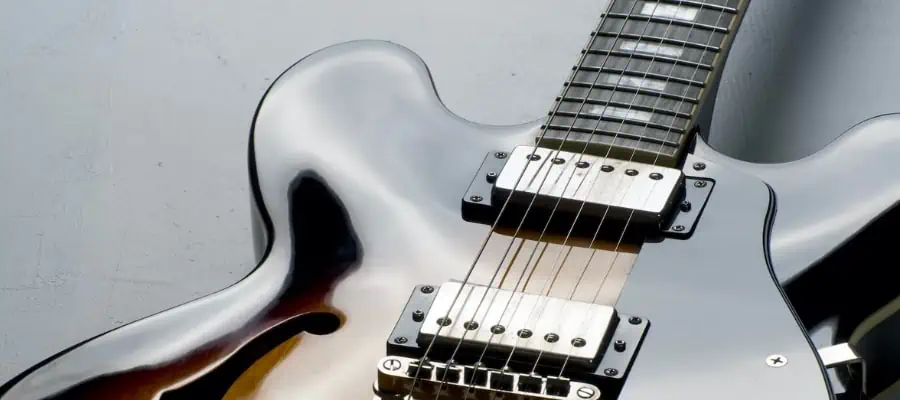There’s nothing worse than getting your guitar out of its case to see that its strings have been damaged or broken. Since most of us do our best to keep our instruments in optimal condition, the next logical step is to get to the root of the issue – how did this happen? Can guitar strings break on their own?
Guitar strings can break on their own, but it’s pretty rare. Guitar strings are usually made of metal and, thus, pretty resilient unless pressured. However, when the instrument is kept in extreme humidity or temperature conditions, the material can deteriorate to breakage.
If you’re interested in learning more about the most common instances in which guitar strings can become susceptible to damage even without applying any pressure, make sure to read on. At the end of this article, I’ll also take you through some of my top tips on ensuring accidents like these never happen again, so you’ll want to stick around until the end for this one.
When Can Guitar Strings Break on Their Own?

Though guitar strings snapping on their own is a phenomenon that (thankfully) doesn’t happen very often, it’s still something to look out for if your guitar is particularly old, defective, or stored in sub-par conditions.
Being well-informed on the most common instances in which your guitar’s strings are susceptible to incidental damage can help you take much better care of the instrument. So, without further ado, let’s explore some of the instances in which guitar strings can break on their own.
Sub-Par Storage Conditions
If you’re dealing with such a rare issue, chances are its cause is environmental. Exposure to extreme heat, humidity, or excessive temperature fluctuations can all affect the structural integrity of the metal, gradually weakening it to the point of breakage.
Strings made out of gut or nylon aren’t immune to unsuitable conditions either; if anything, they’re even less resilient. However, since most guitars feature strings made of metal, that’s what I’ll be focusing on for the sake of argument.
Let’s start with humidity. You probably already know that water and metal don’t tend to cohabitate well. Excessive moisture levels can lead to rust and corrosion, which can quickly render any type of metal unusable.
The same can be said of heat or temperature fluctuations. They severely impact the structural integrity of your guitar’s strings since they (and the wooden body around them) tend to expand and shrink as temperatures fluctuate, a cycle that can end up breaking the metal altogether.
Old Strings
A guitar’s strings need to be replaced from time to time in order for the instrument to perform optimally. Unfortunately, many guitar owners, especially more inexperienced ones, tend to forgo this crucial maintenance step altogether.
Though guitar strings are made to last a long time, deterioration is inevitable. With continued use, they’ll start to lose their elasticity and become more brittle; thus, likelier to break on their own.
Defective Strings
This is probably the only instance in which string damage is 100% out of our control. Sometimes, even when a guitar is brand new, its strings might be defective. This is especially true for mass-made guitars produced in factories.
That’s why it’s important to do your due diligence and get the highest-quality model your budget allows.
High String Tension
If you’re an amateur player, leaving string tension adjustment to a pro is best. Either go to your local guitar shop and ask for assistance or get your tutor (if you have one) to teach you how to do it.
That’s because if you keep the tension too high, there’ll be a point where the strings will simply give in and snap.
Contact With Sharp Objects
At the end of every session, you’ll want to be mindful of where you store your guitar. Though putting it back to its designated spot might have become second nature to you, it’s worth checking first to see if any new objects, especially ones with sharp edges, have been introduced to the area.
Contact with other objects will cause micro-tears that aren’t apparent at first but can quickly damage and weaken the strings before ultimately getting them to break.
How To Prevent Guitar Strings From Breaking

Now that you’re aware of the main causes of spontaneous guitar string damage, you’re better able to take steps to prevent the issue from happening again. Here are some of my top tips on how to protect your strings from damage:
- Maintain ideal storage conditions. Make an effort to keep your guitar somewhere where the temperature is mild and consistent, and the humidity level isn’t higher than 40-50%.
- Invest in high-quality strings. Even if you don’t have the budget for a high-end guitar, try to invest in good-quality strings once you can replace your current ones.
- Learn proper technique. Playing too aggressively or using the wrong technique can damage your strings more than you’d think. So, be mindful of your playing style and invest in improving your technique. This is especially important if you’re using thinner strings.
- Replace the strings as necessary. Even when properly maintained and cared for, strings will still age and deteriorate, thus, losing their tone and elasticity. So, determine a replacement schedule depending on how often you play your guitar and stick to it.
- Check for sharp edges. Sharp edges aren’t only found on surrounding objects. The bridge, nut, and frets of your guitar can also break the strings immaturely if they’re too sharp, so make sure to smooth out any edges.
Conclusion
While there are several reasons that might lead to your guitar strings snapping on their own, the phenomenon it’s pretty rare. Generally speaking, the performance and longevity of our instruments depend on how well we take care of them, and while that might be discouraging to hear in this context, it also means that there are some steps you can take to prevent the problem from recurring.
So, work on your playing technique, make regular check-ups a priority, and try to store your guitar in suitable conditions – I guarantee the strings will stay intact for a long time.
If you found this article useful, you may want to save this pin below to your Guitar board.

Recent Posts
When learning new songs have you noticed that some of the chord sequences sound really good? But when you tried to come up with your own chord sequence, or as we call it chord progression, you found...
Some guitarists insist on buying an expensive amplifier with their electric guitar. They assume that this is a must for every type of guitarist out there. However, in some situations, this isn’t...

